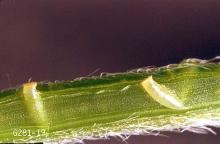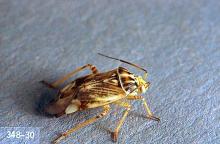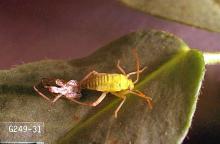Lygus spp., includes tarnished plant bug (Lygus lineolaris)
Pest description and crop damage Adult lygus bugs are oval-shaped, about 4 mm in length with a light yellow 'V' on the back. These bugs feed on developing leaves, flowers and fruit, which kills the tissue around the feeding site. Lygus bugs can be a contaminant in mechanically harvested berries.
Biology and life history The insect overwinters as an adult in protected areas such as organic debris piles, in bark cracks, etc. Adults become active in early spring, feeding on buds of trees and shrubs before moving to other plants. Eggs are laid in the stems and other tissues of host plants. After the nymphs hatch, they begin feeding on plant tissue. There may be several generations per year.
Management-cultural control
Eliminate weeds that serve as protection and early season food for the insect.
Management-chemical control: HOME USE
Adults display considerable resistance to pesticides; chemical sprays should be directed at controlling the nymphs.
- azadirachtin -Some formulations are OMRI-listed for organic use.
- bifenthrin
- carbaryl
- esfenvalerate
- horticultural oils
- kaolin-When applied as a spray to leaves, stems, and fruit, it acts as a repellent to some insect pests. Some formulations are OMRI-listed for organic use.
- permethrin (for use on raspberry only)
- plant essential oils (clove, garlic, peppermint, rosemary)-Some formulations are OMRI-listed for organic use.
- pyrethrins-Some formulations are OMRI-listed for organic use.
- zeta-cypermethrin
Management-chemical control: COMMERCIAL USE
- azadirachtin (AzaMax, Ecozin Plus and others) at 0.01 to 0.03 lb ai/A. PHI 0 days. Some formulations OMRI-listed for organic use.
- Beauveria bassiana (Mycotrol and other brands)-Consult label for rate. Some formulations are OMRI-listed for organic use.
- fenpropathrin (Danitol) at 0.2 to 0.3 lb ai/A. PHI 3 days. Do not exceed two applications per season. Restricted use pesticide.
- malathion-Consult label for rates. PHI 1 day. Thorough coverage is important.
- neem oil (Debug on and others). Consult label for rate. PHI 0 days.
- pyrethrins (PyGanic) at 0.014 to 0.05 lb ai/A. PHI 0 days. Some formulations OMRI-listed for organic use. Do not apply when bees are actively foraging.
- thiamethoxam (Actara) at 0.047 lb ai/A. PHI 3 days. Do not apply during bloom or when bees are foraging in the area. Note "Bee Advisory Box" and restrictions on the label.



